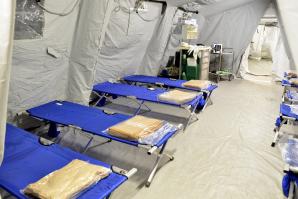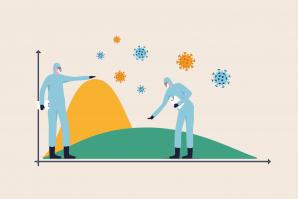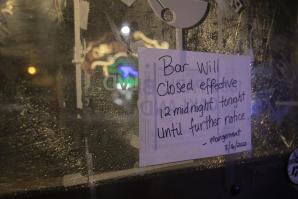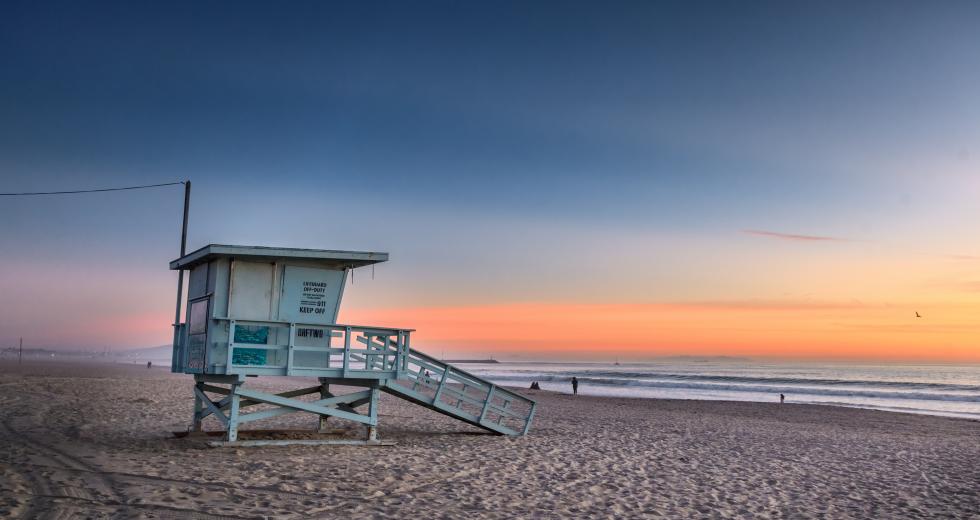Following a sunny weekend when Californians flocked to beaches and hiking trails despite a government order to stay home, Gov. Gavin Newsom announced Monday a “soft closure” of state parks to curb the spread of coronavirus.
While not completely blocking access to natural open spaces, the governor’s action immediately closes parking lots at many state parks and beaches, in an effort to drastically reduce the number of visitors.
“We can’t see what we saw over the weekend happen again,” he said, adding that rangers will step up enforcement to keep people six feet away from each other. A list of park closures is available here.
Click here for more coronavirus coverage
Newsom also delivered more sober news about how the pandemic is affecting Californians: He said unemployment claims in the state have skyrocketed over the last week — to a new daily average of 106,000, from what had been an average of 2,500.
And he said the state is anticipating a need for far more hospital beds than originally forecast to care for Californians who become sick with COVID-19. California needs 50,000 hospital beds to cope with the epidemic, Newsom said Monday — up from the 20,000 hospital beds he projected last week.
Newsom attributed the increase to new data from such sources as Johns Hopkins University, Facebook, the infectious-disease analytics firm Bluedot and the mapping company Esri. “We sat down — based on the new modeling that came in this weekend — and we said we needed to update those numbers,” Newsom said.
The hospital system will provide 30,000 of those beds in existing facilities — such as outbuildings on hospital campuses and tents that can be set up in parking lots, according to the governor. Another 20,000 beds will need to come from outside the hospital system.
Of those, the state has lined up about 3,000, including in three hospitals the state has acquired: Seton Medical Center in Daly City, Community Hospital in Long Beach and St. Vincent Medical Center in Los Angeles.
A naval hospital ship, the USNS Mercy, is on its way to the port of Los Angeles. And two field hospitals of the eight that the federal government has promised also arrived in the state: One will be erected at the Santa Clara Convention Center and the other at fairgrounds in Riverside. All told, the eight field hospitals should contribute 2,000 beds to the state’s total, Newsom said.
He linked the decision to close parks with the expected increasing demand for hospital beds, saying Californians have the power to increase or decrease the number of people who become sick with COVID-19, depending on whether they keep the distance necessary to slow the spread of disease.
“Let us all step up our game and recognize our obligation not just to ourselves but to each other,” Newsom said. “That 50,000 bed number that I just gave you assumes that we’re doing that. We have numbers that are substantially higher if we don’t.”
The announcement came as trails and beaches in the Bay Area and Southern California experienced huge crowds over the weekend and as local officials began their own efforts to close them down. Though the statewide order to stay home allows people to go out for fresh air or exercise, as well as for essential trips to get food or medicine or go to work, the throngs that congregated at popular outdoor destinations on Saturday prompted officials to clamp down.
Marin County closed its parks Sunday, including marquee destinations like Point Reyes, Mount Tam and Muir Woods. San Francisco closed its playgrounds on Monday.
In Southern California, towns blocked off basketball courts, removed nets from beach volleyball courts and closed piers to visitors. Santa Monica closed the parking lots at its beaches. Long Beach shut tennis courts, dog parks, playgrounds, skate parks and picnic areas. San Diego shut down city-owned parks, beaches and trails.
Los Angeles Mayor Eric Garcetti admonished people Monday for crowding beaches and trails. He told them to stop it, adding: “We know who you are.”
Newsom lauded local officials for taking steps to close parks but said more needs to be done. Park rangers will break up groups with verbal warnings, the governor said, adding that they also have the power to issue citations.
“When you’re out there and you can’t even find parking at a beach, it suggests you’re not going to practice social distancing,” Newsom said.
He told Californians he is closing parking lots at state parks “to help you help yourself.”
Newsom’s stay-at-home order allows law enforcement to charge people with misdemeanors or issue fines of up to $1,000 for violations. But several police departments CalMatters spoke with said they were not taking that approach — yet. Representatives of the San Francisco, Los Angeles, Sacramento, Palm Springs and Riverside police said officers are instead educating people about the need to generally stay at home and keep six feet of distance from others when outdoors.
“For us, right now, it’s not about writing somebody a ticket or trying to ding someone for a violation,” said Riverside Police Department spokesman Ryan Railsback.
“It’s about letting them know that there’s a high potential health risk.”
–
CalMatters reporters Rachel Becker and Adria Watson contributed to this report.
CalMatters.org is a nonprofit, nonpartisan media venture explaining California policies and politics.
Recommended For You

Newsom, Trump: More Beds, Masks, Equipment Ahead for Coronavirus
As California braced for an onslaught of desperately ill coronavirus patients, Gov. Gavin Newsom announced plans over the weekend to open two new hospitals, and President Donald Trump said the federal government will ship a number of mobile hospital units to the state, pay for National Guard deployments and deploy the San Diego-based naval hospital ship Mercy to Los Angeles.

Ask an Expert: How Solid Are California’s Coronavirus Projections?
According to a letter Gov. Newsom sent to President Trump, state models project that more than half of the state could become infected with the novel coronavirus over the next two months. What does this projection mean in context?

With Coronavirus, California’s Economy Is in Uncharted Territory
Social distancing may be good for public health these days, but it isn’t good for the California economy.



